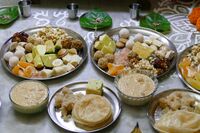Religion:Prasāda
right|thumb|200px|Prasad thaal offered to Nar Narayan at a Swaminarayan temple in Ahmedabad
Prasāda (Sanskrit pronunciation: [pɽɐsaːdɐ], Sanskrit: प्रसाद), variantly spelled as Prasādam, Prasād and Prasāda, is a material substance that is a religious offering in both Hinduism and Sikhism. Most often prasada is vegetarian food consumed by worshippers after worship. Mahaprasāda (also called Bhandārā) in Hinduism, similar to the langar in Sikhism,[1] is the consecrated food offered to the deity in a Hindu temple which is then shared and eaten by the masses without discrimination.[2][3][4] Sometimes this vegetarian offering will exclude the prohibited items such as garlic, onion, etc.[2]
Etymology

Prasāda is derived from the verb prasād which consists of the verb सद् (sad - to sit, dwell) which is prefixed with प्र (pra - before, afore, in front) and used as finite verb प्रसीदति (prasīdati - dwells, presides, pleases or favours etc).[5] It denotes anything, typically food, that is first offered to a deity or saint and then distributed in His or Her name to their followers or others as a good sign.[6]
'Prasāda' is sometimes translated as gift or grace.[7]
Practices
In its material sense, prasāda is created by a process of giving and receiving between a human devotee and the god. For example, a devotee makes an offering of a material substance such as flowers, fruits, or sweets. The deity then 'enjoys' or tastes a bit of the offering.[8] This now-divinely invested substance is called prasāda and is received by the devotee to be ingested, worn, etc. It may be the same material that was originally offered or material offered by others and then re-distributed to other devotees. In many temples, several kinds of prasāda (e.g., nuts, sweets) are distributed to the devotees. [citation needed]
Offering food and subsequently receiving prasāda is central to the practice of puja.[8] Any food that is offered either physically to the image of God or silently in prayer is considered prasāda.[9]
In Sikhism, karah parshad is served to the congregation after prayer and reading of scripture.[10] Parshad represents the same values as langar in that it is served indiscriminately.[citation needed]
Kurukshetra Prasadam (Channa laddu) in 48 kos parikrama of Kurukshetra and Mathura peda in the Braj Parikrama are geo-specialty prasada.[11]
Gallery
See also
References
- ↑ Pashaura Singh, Louis E. Fenech, 2014, The Oxford Handbook of Sikh Studies
- ↑ 2.0 2.1 Chitrita Banerji, 2010, Eating India: Exploring the Food and Culture of the Land of Spices.
- ↑ Subhakanta Behera, 2002, Construction of an identity discourse: Oriya literature and the Jagannath cult (1866-1936), p140-177.
- ↑ Susan Pattinson, 2011, The Final Journey: Complete Hospice Care for the Departing Vaishnavas, pp.220.
- ↑ Apte, Vaman Shivaram (1992). The Practical Sanskrit-English Dictionary.. Kyoto, Japan: Rinsen Book Company. ISBN 4653000387.
- ↑ Natu, Bal, Glimpses of the God-Man, Meher Baba, Sheriar Press, 1987
- ↑ Mukundananda, Swami. "Bhagavad Gita: Chapter 2, Verse 64". https://www.holy-bhagavad-gita.org/chapter/2/verse/64.
- ↑ 8.0 8.1 Hawley, John (2006). The Life of Hinduism. Berkeley and Los Angeles: University of California Press. pp. 13. ISBN 9780520249141.
- ↑ "Prasada | Hinduism" (in en). https://www.britannica.com/topic/prasada.
- ↑ Bhatia, Harbans Singh; Bakshi, Shiri Ram (1999) (in en). Religious Traditions of the Sikhs. Deep & Deep Publications. ISBN 978-81-7629-132-3. https://books.google.com/books?id=kA0RAQAAIAAJ&newbks=0&hl=en.
- ↑ [https://www.tribuneindia.com/news/haryana/chana-laddoo-to-be-kurukshetra-prasadam-49618 Chana laddoo to be ‘Kurukshetra prasadam’, The Tribune, 1 March 2020.
External links





